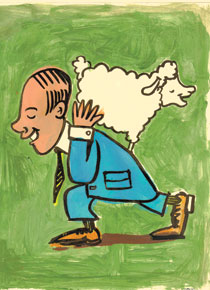Issue Archive
Commentary: Changing Places

Each year on Passover we are asked to imagine ourselves as slaves in Egypt: Avadim hayinu lefar’o bemitzrayim.
For those of us who live in the United States in the 21st century, it is an empathetic stretch, because we are blessed in so many ways.
But perhaps it is not such a stretch to imagine ourselves as Egyptians.
How did the Egyptians feel about the Jewish slaves? Certainly they had a variety of relationships, some kind, some cruel. We know of the Egyptian taskmaster who beat Hebrew slaves, but some Egyptians were charitable: Pharaoh’s daughter saved Moses. One tradition teaches that Shifra and Pu’a, the midwives who saved Israelite children, were in fact Egyptian. Finally, one rabbinic explanation that Egyptians willingly gave of their goods to the fleeing slaves in gratitude for the years of servitude suggests that Egyptians harbored a range of attitudes toward the Jews.
The idea of judaism was in the stranger, philosopher Hermann Cohen beautifully wrote. The Torah mentions the stranger 36 times. The great moral test of life is not how we treat those who have power over us, but how we treat those over whom we have power. It is a hillul Hashem, a desecration of God’s name, to treat the stranger cruelly; it is a kiddush Hashem, a sanctification of God’s name, to be merciful. Remember Egypt not only for what we suffered but for what it means to inflict suffering.
To be sure, there are poor in our Jewish community today; but, for the most part, in America we are closer to the social position of ancient Egyptians than of ancient Israelites. We are the ones who employ people in our businesses or homes. And the tests of power are often more exacting than the tests of powerlessness.
It is a curious and telling point that so many of our great biblical leaders were shepherds. When Samuel is dispatched to the house of Jesse to find a new king for Israel, he meets David, who has been tending sheep. Moses, too, was a shepherd, as was Jacob before him.
The rabbis wryly note this, saying, “When God wishes to find a leader, God looks to see how that person tends sheep.” In other words, to judge someone’s moral character, don’t look at how he or she treats the rich or powerful.
A good person has to care for those who are powerless. On hearing that he would not be able to enter the Land of Israel, what was Moses’ first reaction? He pleaded with God to find someone else to lead the people so the nation would not be “like sheep that have no shepherd.”
That plea was a vindication of what we might call the shepherd principle of selection. Moses cared deeply for the people, praying to God to ensure that his flock would arrive safely in the Promised Land. We were strangers in Egypt, but we were training to be shepherds. We were slaves, but we were liberated so we would know how to take care of each other.
The Talmud teaches that we are rahmanim b’nei rahmanim, merciful people and the children of merciful people. The lesson of Passover is not a lesson solely about Jews, but a lesson about humanity. The same standard we exalted when we were poor and powerless is binding when we are fortunate.
Putting oneself in the place of the other is to ask—would we have behaved better? In our dealings, are we generous or stingy, kind or harsh. Do we use our power with righteousness, and our influence for mercy?
David Wolpe is rabbi of Sinai Temple in Los Angeles. His new book,Why Faith Matters: God and the New Atheism (HarperOne), is due out in September.










 Facebook
Facebook Instagram
Instagram Twitter
Twitter
Leave a Reply